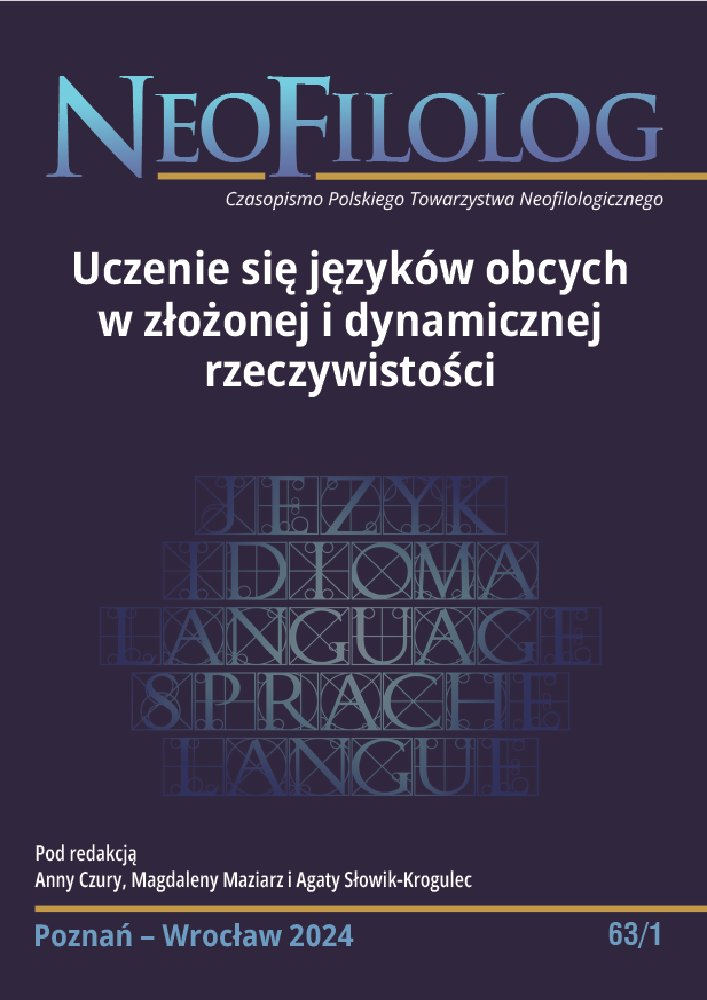Résumé
Among the foreign language learning strategies classified by R. Oxford (1990) as indirect are affective strategies, to which the researcher assigns an important role in regulating the process of acquiring knowledge and skills. One of the basic tools used for this purpose is a diary, which helps a learner identify their feelings, attitudes and motivations related to language learning. It can be kept both in the form of individual notes on paper or through electronic entries on a group forum, including interactive exchange of reflections. The change in the formula makes it not only a personal record, but also a testimony of various cognitive experiences that we share with others. The aim of the article is to present the changes taking place in the chosen form of the diary, which becomes not only a place for reflection, but also for the exchange of learning experiences, including metacognitive and social strategies. The research conducted in the period from the academic year 2018/19 to 2022/2023 covered five classes of first-year students of French Philology at the University of Wrocław and was aimed at examining preferences in relation to an open or closed form of keeping a diary of the learning strategies used. During the longitudinal research, statements from learners were collected (207 questionnaires), which pointed out the advantages and disadvantages of both forms of diary and commented on the usefulness of the tool in reflection on learning strategies used in practice.
Références
Bartnitzky J. (2004), Einsatz eines Lerntagebuchs in der Grundschule zur Förderung der Lern- und Leistungsmotivation. Eine Interventionsstudie. Praca doktorska. Online: https://eldorado.tu-dortmund.de/bitstream/2003/2944/1/BartnitzkyKurzanhangunt.pdf [DW 05.09.2023].
Cadet L. (2007), La genèse des « journaux de bord d’apprentissage ». „Le français aujourd’hui”, vol. 4, nr 159, s. 39–46. DOI: https://doi.org/10.3917/lfa.159.0039
Derenowski M. (2009), Próba ewaluacji „dziennika” jako narzędzia badawczego. „Neofilolog”, nr 33, s. 21–28. DOI: https://doi.org/10.14746/n.2009.33.3
Gebhard J.G., Oprandy R. (1999), Language Teaching Awareness: A Guide to Exploring Beliefs and Practices. Cambridge, New York: Cambridge University Press.
Głowiński M. (1973), Gry powieściowe. Szkice z teorii i historii form narracyjnych. Warszawa: Państwowe Wydawnictwo Naukowe.
Górecka J. (2022), Konstruowanie wiedzy w pisemnych i asynchronicznych interakcjach online. Nowe możliwości dla dydaktyki języków obcych. Poznań: Wydawnictwo Naukowe UAM.
Grabowska M., Wiater A. (2023), Rola nieformalnego uczenia się języków obcych w świadomości studentów filologii francuskiej. „Neofilolog”, nr 60/2, s. 328–361.
Łopatyńska L. (1950), Dziennik osobisty, jego odmiany i przemiany. „Prace Polonistyczne”, seria 8, s. 253–280.
Nerlicki, K. (2009), Dzienniczki uczących się jako narzędzie badawcze – próba oceny. „Neofilolog”, nr 32, s. 151–161. DOI: https://doi.org/10.14746/n.2009.32.12
Newby D., Allan R., Fenner A.-B., Jones B., Komorowska H., Soghikyan K. (2007), Europejskie portfolio dla studentów – przyszłych nauczycieli języków. Warszawa: Centralny Ośrodek Doskonalenia Nauczycieli.
Oxford R.L. (1990), Language Learning Strategies. What Every Teacher Should Know. Boston: Heinle & Heinle Publishers.
Oxford R.L. (1993), Research on Second Language Learning Strategies. „Annual Review of Applied Linguistics”, nr 13, s. 175–187. DOI: https://doi.org/10.1017/S0267190500002452
Podolska J. (1990), Refleksje nad kształtem dziennika literackiego. „Prace Polonistyczne / Studies in Polish Literature”, seria 46, s. 197–223.
Turula A. (2018), E-learning akademicki: perspektywa humanistyczna. Kraków: Wydawnictwo Naukowe UP.
Wiater A. (2016), Stimuler la parole à travers la peinture. L‘entraînement à la créativité dans la perspective du développement de l‘expression orale en langue étrangère. Wrocław: Oficyna Wydawnicza ATUT.
Wiater A. (2024), Le journal de bord comme outil visant le développement des stratégies d’apprentissage. „Academic Journal of Modern Philology”, vol. 21 (Special Issue), s. 105–115.
Wilczyńska W., Michońska-Stadnik A. (2010), Metodologia badań w glottodydaktyce. Kraków: Avalon.
Licence
© Aleksander Wiater 2024

Ce travail est disponible sous licence Creative Commons Attribution - Pas de Modification 4.0 International.
Auteurs :
Les auteurs de textes acceptés pour publication dans la revue Neofilolog sont tenus de remplir, signer et renvoyer à l'adresse de la rédaction, un accord sur l'octroi d'une licence gratuite pour les œuvres, avec obligation d'accorder une sous-licence CC.
En vertu de cet accord, les auteurs des textes publiés dans la revue Neofilolog accordent à l'Université Adam Mickiewicz de Poznań une licence non exclusive et gratuite et permettent l'utilisation de la sous-licence Creative Commons Attribution-NoDerivatives 4.0 International (CC BY-ND 4.0).
Les auteurs se réservent le droit de disposer librement de l'œuvre.
Utilisateurs :
Les utilisateurs d'Internet intéressés ont le droit d'utiliser les œuvres publiées à partir de l'année 2017 sous réserve des conditions suivantes :
- reconnaissance de la qualité d'auteur - l'obligation de fournir des informations sur la qualité d'auteur, le titre, la source (liens vers l'œuvre originale, DOI) et la licence, ainsi que l'œuvre distribuée ;
- sans créer d'œuvres dérivées - l'œuvre doit être conservée dans sa forme originale, p. ex. les traductions ou les interprétations ne peuvent être distribuées sans le consentement de l'auteur.
Tous les textes publiés sont soumis au droit d'auteur.
Autres :
L'Université Adam Mickiewicz de Poznań se réserve le droit à la revue dans son ensemble (mise en page, forme graphique, titre, conception de la couverture, logo, etc.).
.

